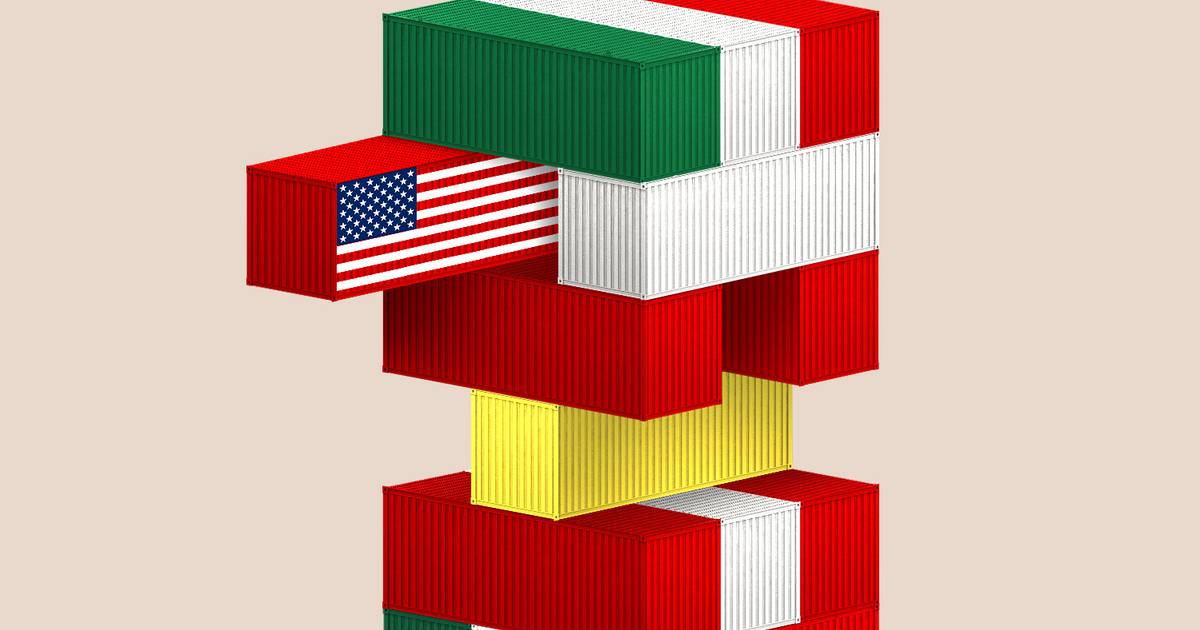Advertising agents are expecting to slow down ads on the background of the uncertainty of tariffs
The possibility of a commercial war with China, Mexico and Canada could cause advertising agents to reduce the budgets and to return to the expenses, the marketing brew, analysts and directors of the industry, said.
This week, the 25% rates of the Trump administration for goods in Mexico and Canada have briefly entered into force, along with an additional 10% rate on China goods. President Donald Trump also said that details about mutual tariffs on other US commercial partners will be revealed in early April. While the details around the tariffs continued to change the administration has postponed some of the tariffs in Mexico and Canada and carved a one-month exemption for producers the self-involvements they could have on business and inflation are considerable challenges for Madison Avenue.
“The fundamental problem on tariffs is that they cause uncertainty,” said Brew Marketing and the founder of S4 Capital, Martin Sorrell, founder and executive president of S4 Capital and founder and former CEO of the WPP. In uncertain times, he added: “Customers are late to make decisions delay, either cancel or delay.”
Ninety -four percent of American advertising agents said they are concerned about the impact of tariffs on advertising expenses, according to a survey to 100 “advertising factors” by the Interactive Advertising Bureau conducted in February. Of those questioned, 45% said they intend to reduce general public spending.
“Due to the potential impact of recently imposed tariffs, the 2025 ad market is expected to gather, adding to the general economic uncertainty,” warned the commercial group in the industry. “This impact will probably be the most visible in the middle of the year, with the retail sectors, electronics of consumption and the media, seeing the biggest discounts.”
PROBLEM PROBLEMS
Business leaders have warned that tariffs may have almost waterproof effects and will cause inflation, especially in the short term. Even President Trump has recognized economic volatility in a Congress speech on Tuesday, saying that “a small disturbance” is expected.
During the post-pandemic inflationary period of 2022, many companies sent costs to consumers, which increased the price of goods. In some cases, those companies then reinveighted these profits in advertising, said Brew Kate Scott-Dawkins, the Global President of Business Intelligence at Groupm.
“You could say:” Well, another period of older inflation, maybe we will see a similar result, “she said. “The question is whether there is still room in American pocket books to go through another fast inflation period immediately after I had only one.”
Companies have two options in fighting tariffs, Sorrell said. “Will the tariff costs be transmitted? Or will they be absorbed by customers, their affected profitability, in which case it will have an impact on advertising.” he said. “If I ultimately transmit it, it can cause inflation and therefore may [cause] Interest rates to grow, which will not be good news. “
Get Marketing News you will like to read actually
Marketing Brew informs marketing professionals about the latest about brand, social media and advertising technology through our weekly bulletin, virtual events, marketing conferences and digital guides.
Rates affecting car manufacturers could have a low impact on the advertising industry. The category spent $ 2.6 billion for linear TV ads in 2024, according to ISPot, and car advertising represents between 7% and 13% of the global income base of major holding companies, according to an estimate of Madison and Wall. Car manufacturers received a redemption of 30 days.
Ruben Schreurs, CEO of the Media Investment Group and the analyst company, EBIQUITY, who work with many of the largest global advertising agents, including US and General Motors, said the rates could spell a disaster.
“I see that this having the potential to become an economic crisis,” Schreurs said.
The big technology companies, which absorb huge amounts of advertising expenses, can also see effects from disturbance. Both Google and Meta have benefited from a flood of advertising expenses from the Chinese Electronic Market Shein and Temu, who have faced business pressures from a closed gap that allowed them to deliver items that cost less than $ 800 to the US without taxes. Trump delayed the repeal of this exception in February, after a re -occupation of packages at the customs entry points began to accumulate, but other rates for imported goods in China remain in force.
Bank of America estimates that the two companies represent between 2% and 4% of Meta and Google advertising expenses, with one of the five best Google advertising agents in terms of 2023 advertising, according to The Wall Street Journal. Google, Meta and Amazon refused to comment for this story.
If advertising agents see a withdrawal, expect those companies to feel it, said Scott-Dawkins, if only because “it represents such a big part of the total industry.”
Companies in industries are already created for fall. It seems that Walmart has asked for his Chinese suppliers to bear the rates, according to Bloomberg, while the Japanese brands Sony and Suntory opt for the US stock inventory, Reuters reported.
The increasing tensions of the trading partners could mean other less favorable business conditions for brands. The Ontario liqueur control council, which controls the sale of most alcoholic beverages in the Canadian province, has removed American alcohol brands from reprisal shelves, which the directors have reported could cause bigger problems.
“It is worse than a tariff,” Lawson Whiting, President and CEO Brown, told investors, who owns liqueur brands such as Jack Daniel and Woodford Reserve Woodford. “It is literally eliminating sales, completely eliminating our products from the shelves.”
#Advertising #agents #expecting #slow #ads #background #uncertainty #tariffs
